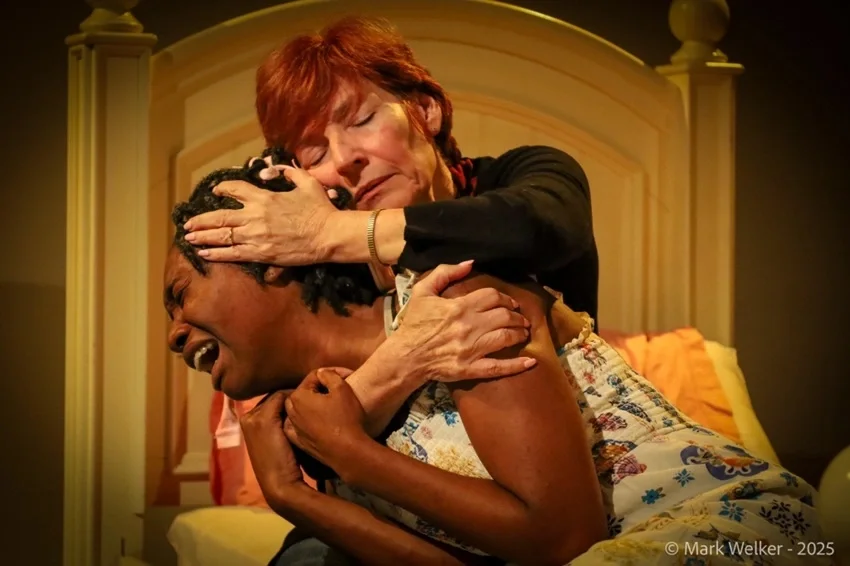Captivity, Compassion, and Control Collide in Scapegoat Initiative's Bold Kelly and Du
This review was first published by Triangle Review on 25 July 2025.
Scapegoat Initiative, a newly minted Durham-based theater company founded by actor and activist Arin Dickson, isn't easing into the local scene quietly. Instead, it announces itself with a gut punch: Keely and Du, the Pulitzer-nominated 1993 drama by the mysterious playwright "Jane Martin." Staged at the intimate Shadowbox Studio in Durham and running 110 minutes, without intermission, this production confronts reproductive rights, religious extremism, and the complicated terrain of female relationships.
At the start of the play, the year is 1993. Although the Roe v. Wade decision legalizing abortion across America was decided 20 years ago, anti-abortion groups and pro-life activists are blocking the sidewalks to abortion clinics with increasing violence.
The play opens in a bare concrete basement, designed to evoke a sort of twisted womb that embodies confinement rather than comfort. It's here that Keely, a pregnant woman kidnapped outside an abortion clinic, wakes up shackled to a bed by members of an anti-abortion group known as "Operation Retrieval." Her captors believe that they are saving her unborn child and, by extension, her soul.
A kindly middle-aged woman named Du (played by Christine A. Rogers) is singing as she tidies the bed and basement. It isn't long before Walter, the self-righteous pastor portrayed by Dan Oliver, delivers unconscious Keely (Akili Holder-Cozart) into the space, and into their mission. Their plan is to confine Keely for 5 months, until she will no longer be able to get an abortion.
Director Dustin Britt doesn't shy away from the disturbing premise. His decision to cast a Black actress as Keely was intentional, acknowledging the disproportionate impact of domestic violence, sexual assault, and abortion restrictions on low-income women of color. In this context, Keely's story becomes even more urgent and visceral.
Holder-Cozart's soulful outbursts fill the room with Keely's pent-up anger and resentment, while her facial expressions demonstrate the infuriating helplessness she feels, not just in her kidnapping but in her life. Holder-Cozart's Keely is a woman who has already endured unimaginable violence -- raped by her abusive ex-husband -- and now finds herself violated again under the guise of moral salvation.
As Du, Rogers is equally compelling, portraying a woman who sincerely believes she is doing the right thing. Rogers' Du is no cartoonish zealot but a figure of gentle conviction, whose worldview is gradually complicated by her growing affection for Keely. Rogers balances maternal concern with quiet desperation, revealing the cracks in Du's faith without ever fully abandoning it.
Dan Oliver delivers the character of Walter with the cadence of a Baptist preacher and the conviction of a man who has never questioned his own authority. His speeches -- biblical, paternalistic, and self-aggrandizing -- are delivered with infuriating smugness. He truly believes he is the hero in this story.
If there's a misstep in the production, it's the portrayal of Cole, Keely's rapist ex-husband. Played by Alastair Motylinski, Cole lacks the menace and substantiality described by Keely. His brief appearance feels miscast and underwhelming, detracting from an otherwise tightly constructed narrative.
Multiple scene changes are marked by complete darkness, with a narrow triangle of light slicing through the stage whenever the adjoining door opens, as if the audience is actually sitting in the basement where Keely is confined. The minimalist set keeps the focus where it belongs: on the psychological tension between captor and captive, faith and choice, compassion and control.
Though it was written over three decades ago, Keely and Du feels painfully relevant in 2025, three years after the Supreme Court decision to overturn Roe v. Wade. The play's original context -- set during a time of intensifying anti-abortion protests -- echoes our current post-Roe reality with eerie clarity, only this time the protests are to protect a woman's right to abortion. The themes of the play have taken on new urgency, as, across America, access to abortion is increasingly limited, especially for low-income and non-white women who are most vulnerable to the consequences of unwanted pregnancies.
As Britt notes, "Hopefully, we can get past the hypotheticals and statistics and really understand the intimate, human cost of these draconian abortion bans." This production forces the audience to sit with the messiness of the issue, to feel its emotional and ethical weight, and to witness the harm caused when ideology overrides humanity.
Scapegoat Initiative's production of Keely and Du is theater with teeth -- raw, provocative, and necessary. For those willing to confront the difficult questions, seeing Scapegoat Initiative's performance of Keely and Du is a good place to (re-)start the conversation.
Supertitles of the dialogue will be projected above the stage during the remaining performances at 7 p.m. Thursday, July 31st, and Friday, Aug. 1st, making this searing story accessible to a wider audience. Don't miss it.
.

